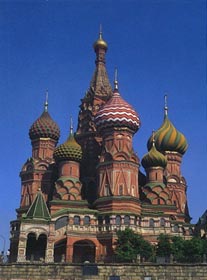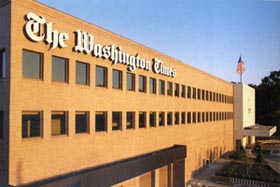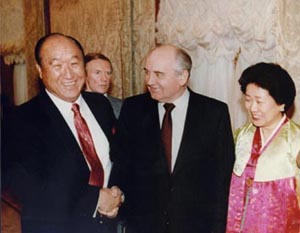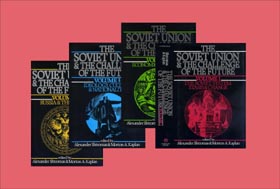
Introduction
In two dizzying years the world witnessed the epic dissolution of the Soviet
empire, beginning with Solidarity's victory in Poland on June 4, 1989,
punctuated by the fall of the Berlin Wall on November 9, 1989 and culminating
with the implosion of the Soviet Union itself December 25, 1991. The sudden
collapse caught most by surprise: the working hypothesis held that communism
would remain a dominant fixture in the world order. Those committed to ending
the communist threat were themselves unprepared for the precipitous nature of
its demise.
 |
| St. Basil's Cathedral on Red Square in Moscow |
Since the conclusion of the Cold War, the rush has been on among scholars,
analysts, and pundits to identify the key personalities and factors which
contributed to the Soviet empire's disintegration. Competing theories abound,
with fundamental roles having been ascribed to Ronald Reagan, Pope John Paul II,
Mikhail Gorbachev, Norman Podhoretz, Alexander Solzhenitzen and Sidney Hook, as
well as to freedom fighters, refuseniks and populist forces such as Solidarity.
Some, in their interpretation of the various developments, have opted to
depersonalize the process, crediting phenomena such as evolving patterns of
economic development, or the information revolution.
 |
| The Washington Times Building |
Lacunae in the postmortem literature on communism's collapse have already begun to be noted.
1 Nevertheless, despite voluminous analysis and commentary, omissions still need to be addressed. Our intent in this article is to point out one particularly salient case. During the Cold War, Korean religious leader Sun Myung Moon and the various organizations which he founded appear frequently and conspicuously in numerous and diverse facets of the war against communism. Literally billions of dollars and a plethora of organizations and activities committed to winning the Cold War can be traced to the initiatives of Rev. Moon. These activities comprised a broad spectrum which spanned the domains of politics, religion, the media, academia, and grassroots activism. Yet, for whatever reason, Rev. Moon has been disregarded in the existing histories purporting to identify contributors to the fall of Soviet communism, whereas other less prominent actors often appear center stage. |
| Reverend and Mrs. Moon meet with Mikhail Gorbachev in the Kremlin on March 31, 1990. |
Among the recent contributions to the postmortem literature is Richard Gid Powers' Not Without Honor (1995), which professes to be "The History of American Anticommunism."
2 This 554-page opus of names and organizations omits all of the American entities associated with Rev. Moon, and their involvement in opposing communism throughout the 1970's and 80's. In the 672 pages of On the Brink: The Dramatic Behind the Scenes Saga of the Reagan Era and the Men and Women who Won the Cold War (1996),3 Jay Winik did record a brief mention of one Rev. Moon-related organization, The Washington Times, but only in noting its early reporting on the unfolding story of Iran Contra.4 |
| Books memorializing the August, 1985 PWPA Conference predicting the collapse of the Soviet Union |
Why have historians omitted Rev. Moon's role in opposing communism during the
Cold War? Given the far-reaching size of the effort and its extensive coverage
by the major print and broadcast media of the time, a serious scholar could
hardly claim complete unfamiliarity with Rev. Moon's involvement during the Cold
War. It is possible, of course, that some historians failed to grasp the
totality of the effort, given the many, diverse organizations involved. On the
other hand, some historians may well have chosen to prejudicially ignore the
literature given the controversial subject, or deigned to distance themselves
from what they may have assumed to be insincere self-promotion. Rev. Moon and
his organizations may also have been summarily dismissed as inconsequential to
the battle against communism. Whatever the motivation for leaving out Rev.
Moon's historic role, the consequence is that students of history have not yet
been afforded a more indepth analysis of what research reveals to be rather
striking activities during the Cold War.
In this article, we do not
pretend to provide an all-encompassing elaboration of Rev. Moon's efforts
against communism. Nevertheless, we will review certain pivotal initiatives and,
where appropriate, indicate the ways in which they impacted upon the Cold War.
We will begin with initiatives in the media, notably The Washington
Times; then turn to efforts at ideological education; and finally treat Rev.
Moon's direct contacts with communist leaders.